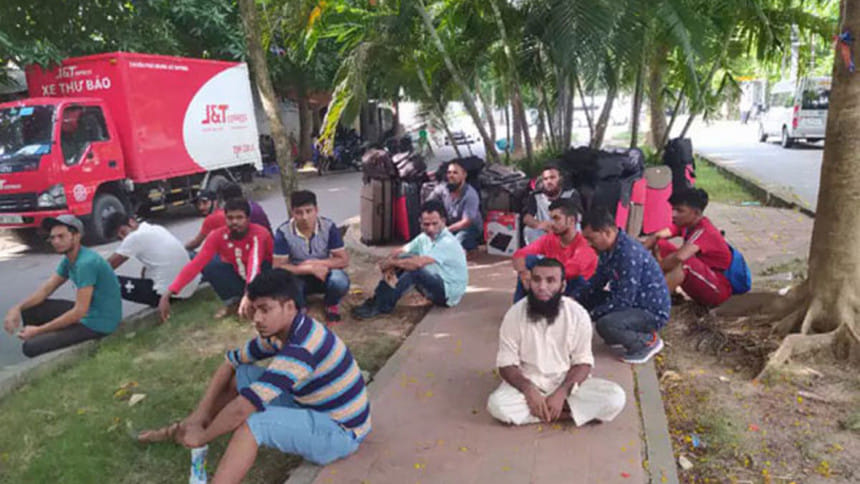From remittance-warriors to criminals

If life were a film with a wholesome ending, traffickers of the 106 Bangladeshis stuck in Vietnam would have been swiftly arrested. Officials who assisted registered agencies to exploit these aspiring and desperate migrants would also have been convicted. In an inevitable tear-jerking climax, a state representative might even have apologised to the migrants and their families for their sufferings, and for the failure of multiple state mechanisms to protect them from their terrible fate.
But life in Bangladesh only really mirrors a horror or a dystopian film. Eighty-one of the trafficked migrants, most of whom were starved, beaten or tortured while in Vietnam, have been thrown in jail following the end of their 14-day quarantine. Just as they were rejoicing at the thought of seeing their families again, after months of worrying about whether they would even make it out of Vietnam alive, they were arrested under the highly controversial Section 54 of The Code of Criminal Procedure, 1898. Their crime? The unforgivable: "Tarnishing the image of the state and putting a negative impact on the labour industry."
The GD states that the police received information that they were involved in various criminal activities abroad but that their sentences were pardoned in view of Covid-19. It also says that, if released, they could engage in various crimes including robbery, family violence, killing, and militancy, and that while in institutional quarantine, they plotted in groups against the state, according to information received by the police through anonymous sources.
The charges would have been convincing had it not been for the fact that the GD is identical to the one submitted for the 219 other returnees from Kuwait, Qatar, and Bahrain on July 3. Unlike these 219 migrants who were pardoned for their petty crimes in their host countries (many were detained in violation of their rights and oftentimes for as simple a reason as stepping out to buy some food), the Vietnam returnees were not actually convicted of any crime or jailed during their stay there, as far as we know. In fact, for the last seven months, the migrants have tried all possible means of communicating with the authorities in Vietnam and Bangladesh, including the Bangladesh Embassy in Vietnam. They have consistently maintained that they were trafficked into Vietnam by licensed agencies who provided them with clearances from the Bureau of Manpower, Employment and Training (BMET) for Tk 3.5-5 lakh. They have named the agents who preyed upon them in their villages and hometowns, and they have provided convincing accounts of the whole process of being duped in Bangladesh and being exploited once in Vietnam.
They have even admitted that they were made to carry USD 5,000 by their agents, which was subsequently taken from them by the Bangladeshi traffickers in Vietnam. They have uploaded photos and videos depicting the miserable conditions they were in, and of the callousness of the Bangladeshi embassy when they reached out to them begging for help. They have gone "live" on Facebook to entreat the prime minister to rescue them and to plead with embassy officials to provide them with some food so that they didn't starve to death. They have broken down into tears talking about how helpless they felt, how scared and hungry, and they have highlighted, again and again, how desperately they craved intervention from the state!
"We don't have any money to feed ourselves, how are we going to fund our flights?" one returnee exclaimed passionately during a Facebook live session of Noakhali TV on June 26. "That's why we said we will take to the streets, if necessary. We will break the rules and regulations of Vietnam and stage a hunger strike—that's when Bangladesh, i.e. the Bangladesh ambassador, will realise the true meaning of the term 'illegal'."
And this, really, is their true crime—that they did not suffer in silence, that they dared to ask, nay, demand that the government give them some dignity and ensure justice for the inhumane crimes committed against them.
On July 6, the Ministry of Foreign Affairs (MoFA) in a press release admitted that these Bangladeshis were lured by human traffickers in Vietnam. However, it went on to add that 27 "illegal Bangladeshi migrants"—not victims of human trafficking, mind you—"tried to forcibly occupy the Hanoi embassy of Bangladesh," and that they went live on social media "making derogatory comments against Bangladesh". It also said that "a certain quarter is trying to tarnish Bangladesh's recent success in controlling human trafficking by threatening to attack Bangladesh missions abroad involving illegal Bangladeshi migrants." The Foreign Minister Dr AK Abdul Momen even blamed a new organisation called "Prabashi Odhikar Parishad", led by Dhaka University Central Students Union (DUCSU) VP Nurul Haque Nur, for patronising the migrants (a proposition so ridiculous it does not even merit a response), and suggested that those who go abroad illegally should be sent behind bars alongside traffickers.
The government's tendency to criminalise migrants, especially victims of trafficking, is, unfortunately, nothing new. We frequently hear how it is really the "greedy" migrants who are to blame for their ill-fates when they get duped by trafficking agents. "You cannot teach thesepeople any better," say our policymakers and bureaucrats disdainfully, as if talking about the scum of the earth, "they will go abroad through illegal means no matter how much you try to help them, get caught and give us a bad name." Our learned bureaucrats refuse to acknowledge the socio-political realities of aspiring migrants' lives which compel them to seek fortunes abroad, selling their homestead land or borrowing huge sums of money they don't even know how they would pay back if things don't go as planned.
A recent study by the International Organization for Migration (IOM) found that 99 percent of potential migrants would choose to remain in the country if they had better job opportunities in Bangladesh. But for our bureaucrats, acknowledging this would entail actually admitting that despite the glitzy promises of growth and development, large masses of the population are still deprived of basic necessities, including a living wage, financial security, and a social protection system. These bureaucrats will not address the corrupt officials in their own ranks who sell off people into modern slavery to make a quick buck. And they will skilfully skirt around the fact that state negligence and complicity enable both registered and unregistered errant agencies to prey on vulnerable populations with complete impunity. They see no hypocrisy in the reality that the state has no reservations about receiving billions of dollars in remittances to keep its economy going, but when it comes to protecting the migrants to whom we owe this GDP growth, it is happy to label them as criminals and miscreants and, in this case, throw them in jail and leave them there to rot.
Government officials are keen on using the term "illegal" to dismiss the legitimate claims of these workers, but as the latter have pointed out on multiple occasions, "How are we illegal if we have clearances from BMET? How are we illegal if we trusted the government agency in charge of protecting us and our futures?" It is outrageous that rather than put BMET and the concerned ministries on the dock, we are having to defend the victims of trafficking for speaking out about their plight and for demanding justice. From the government's end, they have said they will cut the concerned agencies some slack because they have "already suffered enough" due to the pandemic. Our workers, on the other hand, apparently need to suffer a lot more.
Sushmita S Preetha is a journalist and researcher.

 For all latest news, follow The Daily Star's Google News channel.
For all latest news, follow The Daily Star's Google News channel. 



Comments